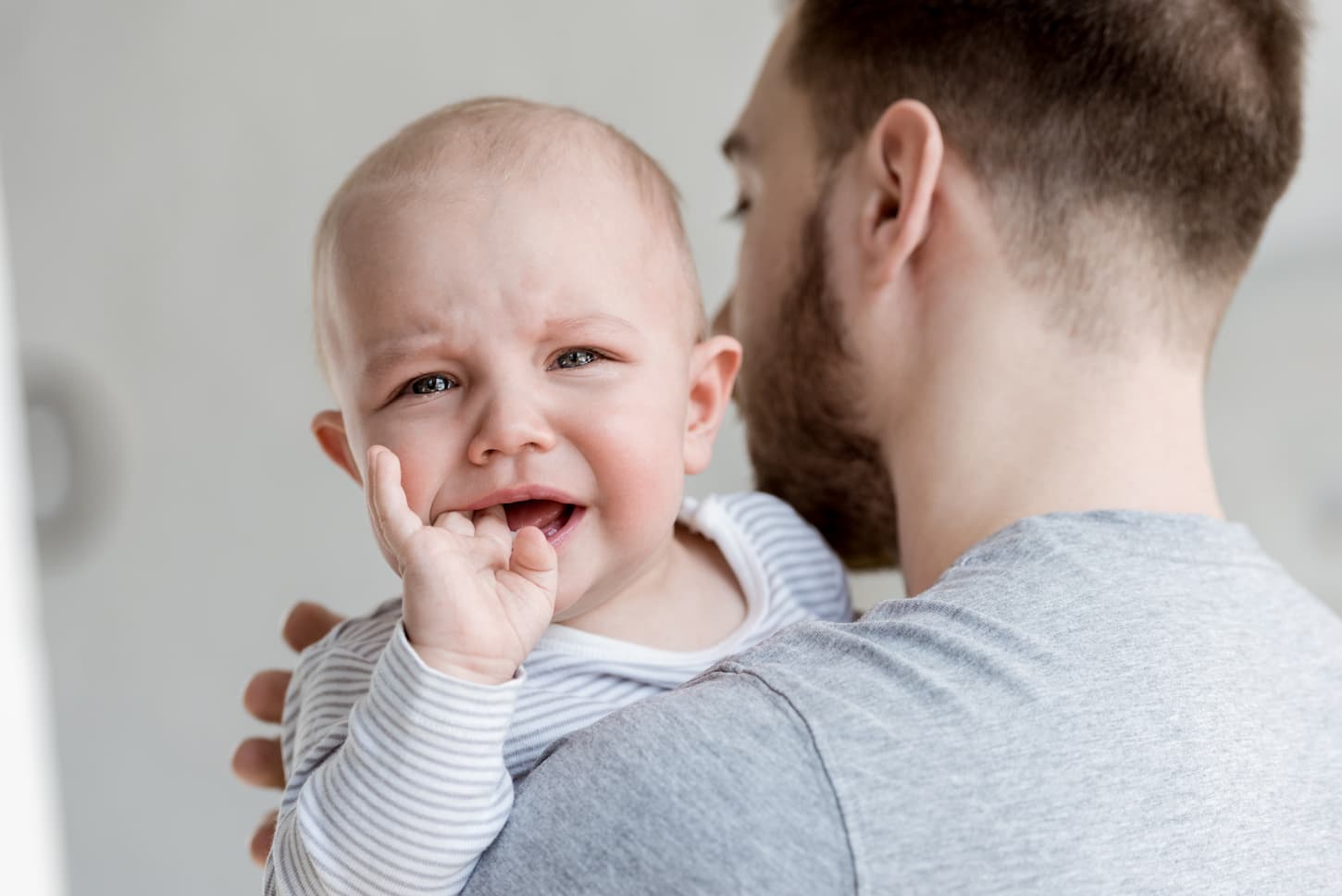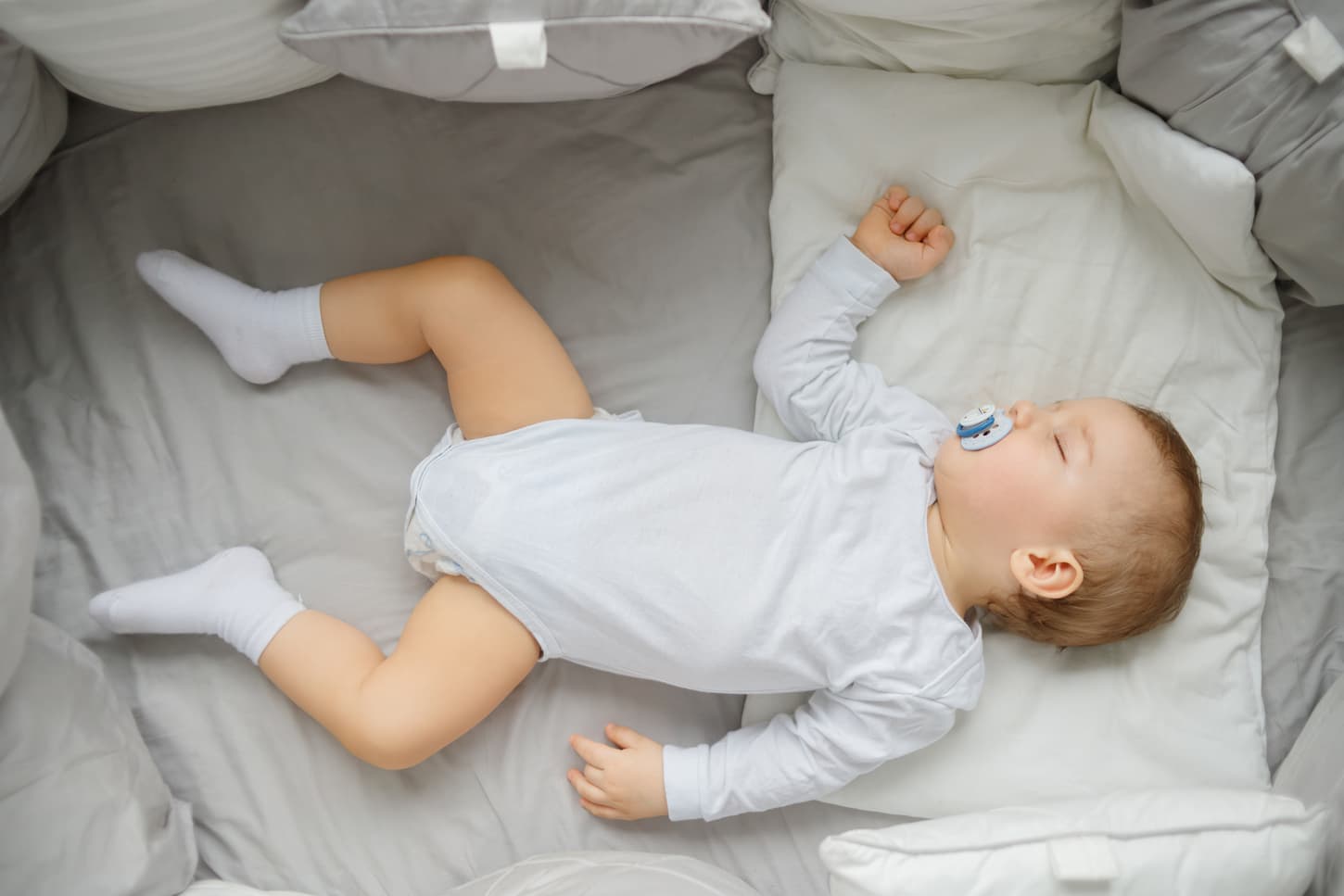It’s normal for newborn babies to wake up repeatedly during the night for regular feeding. From around six weeks, many babies will settle for longer periods at night. But at around 4-months, this new, blissful nighttime sleeping routine can suddenly go out the window. So what exactly is making your baby wake up every two hours after bedtime?
At around 4-months old, babies start becoming aware of night and day, and they will establish nighttime deep-sleep cycles, which are approximately two hours long. It’s common for babies to wake up after each 2-hour cycle, but some babies don’t know how to get back asleep again.
Many things can disturb your baby during the night and cause them to wake up as they pass between sleep cycles. So, if you want to know more about your baby’s sleep cycles and how to help them sleep for longer periods at night, take a look at this vital information below.

Why Does My Baby Wake Up 2 Hours After Going to bed?
Babies develop a lot in the first year and reaching major developmental milestones can affect their sleep patterns. Up until 3 or 4-months, babies‘ sleep patterns are naturally erratic. But after four months, things such as growth spurts and teething can make your baby wake up every two hours.
To give you a clearer understanding of this, below, we’ll take a look at why babies wake up 2 hours after going to bed, according to their age.
Newborn
It’s normal for a newborn to wake up every two hours for feeding during the night. Newborns need regular feedings throughout the night to help them grow and develop. As well as this, newborn babies don’t have a clear sense of night and day. If your newborn baby wakes up every two hours during the night, this is perfectly normal.
6 to 12 Weeks
At 6 to 12 weeks old, babies usually start having longer sleeps and more distinctive awake and sleep patterns. At this age, babies are more alert during the day, and their night sleep cycles can last between 4 and 6 hours long. If babies are waking up every two hours at this age, it could mean they’re not eating enough during the day, they’re over or under tired, or there’s a problem with their sleeping environment.
12 weeks to 4 months
It’s common for babies to start waking up every two hours at 4-months old. At this age, babies develop their cardiac rhythm. The cardiac rhythm is what helps babies respond day and night. From around 4 months old, babies will generally be more alert and active during the day, and their daytime sleep cycle will be approximately 45 minutes long.
At night, your baby will start to experience 2-hour long sleep cycles, just like adults do. It’s normal for babies and adults to wake after a deep sleep cycle. However, the difference with adults is, that we’ve learned to fall back asleep again without even noticing waking up. But some 4-month-old babies don’t understand what’s going on when they wake up, nor do they know how to fall asleep again unaided.
Sometimes, the 2-hour wakings might happen after midnight. After midnight, the sleep hormone, melatonin, starts to wear off. Thus, babies will sleep lighter and are less motivated to go back to sleep.
6 Months to 12 Months
Between 6 and 12 months old, your child will reach many development milestones such as rolling, sitting, and crawling. The excitement of learning these new skills is enough to disturb their sleep pattern. It’s common for babies to have a sleep regression at 6, 8, and 12 months old.

What’s Sleep Regression?
A sleep regression is when your baby suddenly falls out of a steady sleeping routine. Sleep regressions often occur when your baby reaches a major development milestone. Illness, teething, or a problem with your baby’s sleeping environment can also cause sleep regression.
If your baby hasn’t established a good sleeping pattern, they can’t go through a sleep regression. But, if your baby was sleeping fine but is now waking frequently, they might be going through a sleep regression. Sleep regressions can last for between 2 and 6 weeks, and it’s common for babies to experience a sleep regression at around 4 months old.
At four months old, your baby will be more aware of their environment and sleep associations too. They will notice if they fall asleep in your arms and wake up alone in their crib. Many parents start with gentle sleep training methods at 4-months old to help their baby sleep better and minimize the disturbance of sleep regressions.
What’s Sleep Training?
Sleep training is when you help your baby to develop healthy sleeping habits. The optimum time to start sleep training is around 6-months old, but each baby is different. Some babies might be ready to start gentle sleep training before 6 months of age.
Many parents start sleep training at around 4 or 5 months old, but you should only begin sleep training your baby if they’re ready for it.
A common sign that your baby is ready for sleep training is when they start having longer sleeps at night unaided. If you’re unsure whether your baby is ready for sleep training, you can speak to your physician for advice.
Sleep training your baby involves introducing them to positive sleep cues and teaching them how to self-soothe. When babies can do these things, it makes them more able to deal with sleep regressions or regular two-hour night wakings.
Self-Soothing: what it is and how to develop it
Self-soothing is when your baby can wake up, cry, and fall back to sleep again unaided. In other words, they don’t need to be rocked in your arms to fall back to sleep. Some babies can naturally self-soothe from around three months old, but some babies need to learn it.
You can teach your baby to self-soothe with the Five S’s
- Sucking – on a pacifier
- Shushing
- Swaddling – if your baby can’t roll over
- Swinging
- Side or stomach position – but then put the baby down to sleep on their back
When babies wake up every two hours at night, if you know your baby can self-soothe, you might feel more confident about letting them cry it out.
Here are some things your baby will do to self-soothe:
- Suck fingers, thumbs, or a pacifier
- Rock back and forward
- Shift positions
- Lift legs into a fetal position
- Make cooing, babbling, or humming noises
- Banging feet, arms, or head against the mattress.
Self-soothing is an amazing skill to learn, but it doesn’t happen overnight. It can take weeks or even months for a baby to learn this skill.
Sleep Associations: what they are and how they develop
From around four months old, babies start to develop sleep associations. So, if you feed them to get them off to sleep, they will associate feeding with sleeping and might not be able to sleep without being fed. Or if you always rock your baby to sleep in your arms, they won’t be able to sleep without your close physical contact. These are examples of negative sleep associations.
A big part of sleep training involves introducing positive sleep associations into your baby’s routine. Positive sleep associations include lullabies, dimmed lights, white noise, or swaddling. When babies develop positive sleep associations, it’s easier for them to self-soothe, and overall, nighttime wakings will be less dramatic.

Do I Have to Sleep Train Again if They Wake Up?
If your baby starts waking up at night, it’s better to stick to your sleep training schedule as much as possible. In many cases, you won’t have to restart sleep training, but keep your routine flexible to suit your baby’s developmental needs.
Babies thrive with routine, and sleep training can help to minimize the disturbance caused by a sleep regression. As long as your baby isn’t ill or suffering, you can continue sleep training during a sleep disturbance or sleep regression. Stick to your routine as much as possible, and don’t make drastic changes.
To help your baby overcome a sleep regression, follow an eat-play-sleep routine during the day. This will help your baby burn off calories, and it will also stop them from associating feeding with sleeping. Furthermore, you should take your baby outside a lot during the day to get fresh air and plenty of natural daylight.
During a sleep regression, give your baby extra comfort at bedtime to help send them into a deeper sleep. If your baby wakes up during the night, try and keep yourself and their environment calm. A calm environment will help your baby doze off again, so make sure you keep lights, noise, and activity to a minimum.
Other Reasons Why Your Child Wakes Up at Night
Your baby may wake during the night due to hunger, teething, illness, or because they’re over or under tired. Babies are super sensitive, and many things can cause a sleep disturbance, and not all of them necessarily signal a sleep regression.
Reason #1: Hunger
Sometimes babies wake up during the night because they’re hungry. Babies who don’t drink enough during the day may wake up regularly during the night due to hunger.
To help prevent your baby from waking up during the night due to hunger, make sure your baby gets most of their milk rations during the day. If your baby struggles to have a large meal because they fall asleep, keep them stimulated and distracted while they’re feeding, and stick to an eat-play-sleep routine.
To help your baby feel full up at night, give them a good feed before bedtime. You can also give your baby a “dream feed” at night before you go to bed.
A dream feed is when you give your baby an extra meal between 10 pm and midnight without rousing them fully. A dream feed may help your baby sleep for longer periods during the night, especially if they have an early bedtime.
Read more about hungry babies here: Do You Feed Baby When Sleep Training? (Plus 11 Tips).
Reason #2: Diaper Issues
Babies will also wake up at night if they have a full diaper. It’s common enough that it can be a good idea to give their diaper a quick pat to see if it’s the reason your baby woke up.
After all, nobody wants to sleep in a poopy diaper – or even a full one.
Pro tip: always have your baby sleep in a onesie. They can be light enough for even warm nights or can be layered for cold nights. But a baby wearing a diaper and a onesie is far less likely to pull off a diaper – or dig into it for some impromptu “finger painting.”
If your baby does start “finger painting” with diaper contents or feces, you’ll want to make any access to the diaper impossible by using long-legged onesies or pajamas.

Reason #3: Over or Under Tiredness
Too much or too little sleep during the day can make your baby wake up regularly during the night. If a baby doesn’t sleep enough during the day, instead of sleeping more soundly at night, it can make them wake up even more. When babies are overtired, they become stressed, so it’s hard for them to sleep.
If your baby is sleeping too much during the day, this will also keep them awake at night. Make sure your baby is getting the right amount of sleep during the day to prevent them from waking up at night. If necessary, keep a diary of daytime naps to see how much your baby is sleeping.
Reason #4: Teething
For most babies, teething starts at around 4-months, and the first teeth usually appear at six months. Babies will usually get more teeth through at 10, 15, and 24 months. The most painful part of teething is when the teeth come through the gums, and sometimes this may cause your baby to wake up during the night.
You’ll know your baby is teething because they will start drooling and have a strong desire to chew things. Babies may also have red gums, a flushed face, and be cranky and irritable when they’re teething. In most cases, teething pain should only last, on average, 1 to 3 days, during which time, try and stick as much as you can to your baby’s the sleeping schedule.
The FDA advises against using topical teething gels and treatments on your baby, and you should only use medication for teething pain as a last resort. Always speak to your physician first before you give medication to your baby.
Need more info on dealing with teething? Read our article here: How to Sleep Train When Baby is Teething?
Reason #5: Environmental Problems
Babies are super sensitive, so maybe a problem in their environment keeps waking them up every two hours. If your baby is too warm, they may struggle to stay asleep all night. The ideal room temperature for a sleeping baby is between 68 to 72 degrees Fahrenheit.
Noise and lights may also wake your baby up during the night. So, a barking dog or a flashing security light outside could wake your baby up during the night. Keep light to a minimum in your baby’s bedroom with blackout curtains and remove any nightlights.
Want to know if the baby’s mattress matters? Spoilers: it does. Read why here: Does The Mattress Affect Baby’s Sleep?
Reason #6: Growth Spurt
Babies go through regular growth spurts in the first year. The most common growth spurts happen at 2-3 weeks, 6-weeks, 3-4 months, 6-months, and 11 to 12 months old. Your baby needs lots of extra calories during a growth spurt, and often, they’ll wake up more during the night for extra feeding.
You’ll know your baby is going through a growth spurt when they can’t seem to get enough to eat, and they suddenly gain weight.
Growth spurts usually last between 1 day to 1 week, and you must feed your baby as much as they want during a growth spurt. To minimize sleep disruptions during a growth spurt, feed your baby as much as you can during the daytime.
Reason #7: Illness
Illness can also make your baby wake up regularly during the night. Babies are more prone to infections after 6 months old when they start putting things in their mouths.
If you think your baby is ill, don’t hesitate to seek advice from a health care professional. Furthermore, If your baby wakes up because they’re ill, give them all the comfort they need. Usually, a baby’s sleep routine will go back to normal after a bout of illness.
Here is some more reading for you on illness in babies that we wrote.

Best Products For Helping Your Baby Sleep
- You really need some kind of a white noise machine. Usually, I like the Marpac Dohm classic white noise machine (on Amazon), but this baby white noise machine on Amazon also has a built-in nightlight and an app, so it could be a great choice for families who need all the things at once.
- Everyone sleeps better with enough sleep, and sleep is best in the dark. Get yourself, your baby, and your family some blackout curtains. These blackout curtains on Amazon are a great price but work well.
- From there, make sure your baby gets their wiggles out during the day, including any teething chewing. This teether and chewing toy is a cute option (available on Amazon).
Next Steps
If your baby wakes up every two hours, this could be a sign that something’s not quite right with their sleep schedule.
To combat regular night wakings, consider sleep training your baby if they’re old enough. Establish a bedtime routine, get rid of negative sleep associations, and teach your baby how to self-soothe.
If you already have a sleep training schedule in place, stick to it as much as you can when your baby wakes up at night. But remember to be flexible. Your baby’s safety and comfort should come first over a sleep training schedule.
Next, go read this article about the best sleep training options for young babies, broken down by age. That way, you’ll know what your best options are no matter how old your baby is: Best Sleep Training Methods for Babies Under 6 Months.
Resources
Learning about parenting or sleep training techniques is important to learn from various reputable sources. These are the sources used in this article and our research to be more informed as parents.
- “Baby Milestones: Your Child’s First Year of Development.” WebMD, www.webmd.com/parenting/baby/ss/slideshow-baby-milestones-first-year. Accessed 5 Jan. 2022.
- Bathory, Eleanor, and Suzy Tomopoulos. “Sleep Regulation, Physiology and Development, Sleep Duration and Patterns, and Sleep Hygiene in Infants, Toddlers, and Preschool-Age Children.” Current Problems in Pediatric and Adolescent Health Care, vol. 47, no. 2, 2017, pp. 29–42. Crossref, doi:10.1016/j.cppeds.2016.12.001.
- Beal, Judy A. “Cry It Out.” MCN: The American Journal of Maternal/Child Nursing, vol. 42, no. 3, 2017, p. 180. Crossref, doi:10.1097/nmc.0000000000000325.
- McTigue, Sara. “Understanding Baby Growth Spurts.” Healthline, 16 Dec. 2019, www.healthline.com/health/baby/baby-growth-spurts.
- Mindell, Jodi A., et al. “Developmental Aspects of Sleep Hygiene: Findings from the 2004 National Sleep Foundation Sleep in America Poll.” Sleep Medicine, vol. 10, no. 7, 2009, pp. 771–79. Crossref, doi:10.1016/j.sleep.2008.07.016.
- St James-Roberts, Ian, et al. “Video Evidence That London Infants Can Resettle Themselves Back to Sleep After Waking in the Night, as well as Sleep for Long Periods, by 3 Months of Age.” Journal of Developmental & Behavioral Pediatrics, vol. 36, no. 5, 2015, pp. 324–29. Crossref, doi:10.1097/dbp.0000000000000166.
- Weeks, Nicole. “Baby Sleep Routine: What to Expect.” Practical Research Parenting, 17 Sept. 2015, www.practicalresearchparenting.com/2014/03/29/baby-sleep-routine.
